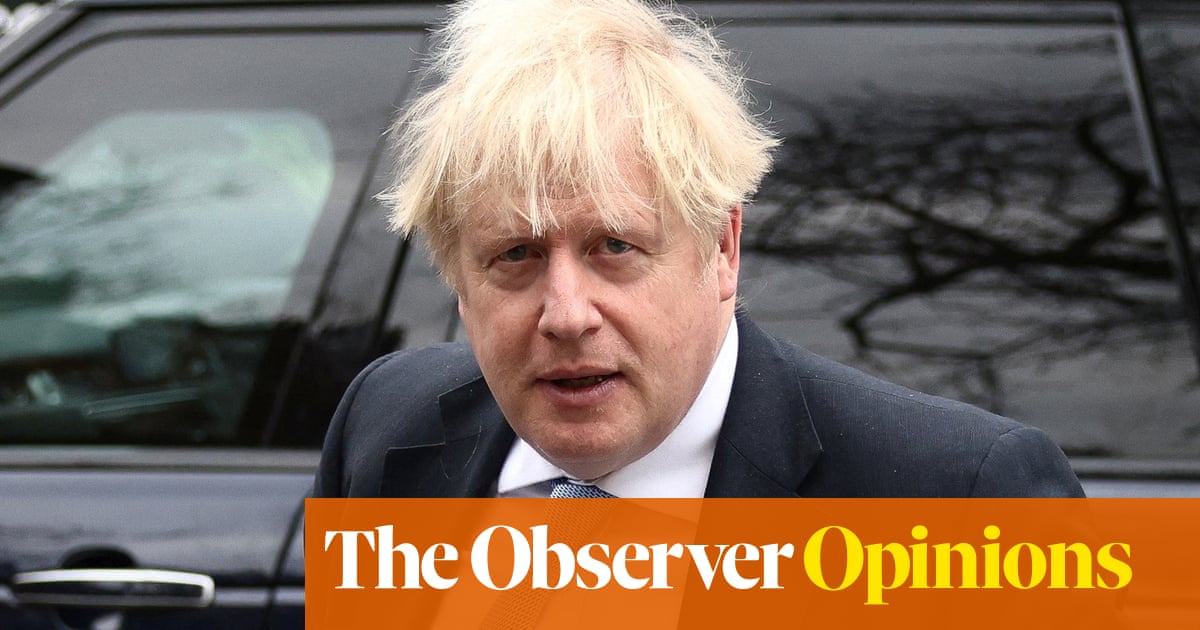
Iwoz framed. Faced with overwhelming, slam-dunk, bang-to-rights evidence against him, the last resort of the old lag is to claim that he is the victim of a conspiracy. Ever since his eviction from the premiership, Boris Johnson has gone around protesting it was the “greatest stitch-up since the Bayeux tapestry”. This is not terribly funny and entirely untrue, neither of which deters him from saying it repeatedly.
He just can’t stop trying to deceive himself and everyone else about why he was removed because he can no more handle the truth than he can speak it. He is compelled to blame anyone but himself because otherwise he would have to face up to the fatal character flaws that self-incinerated his premiership. He will never find it in himself to accept that the architect of Boris Johnson’s disgrace was Boris Johnson. His hunger for a return to power is the other important driver of his ludicrous claim to be the casualty of a miscarriage of justice. The hopes he has of rehabilitating his reputation, and the dreams he still entertains of making a return to Number 10, depend on persuading fellow Tories that he ought not to have been drummed out of Downing Street in the summer of last year.
His reputation deserves no rehabilitation; an encore for his slummy premiership is the last thing that Britain needs. So we should be on instant alert whenever there is an attempt to sanitise his sins.
An operation of that kind is under way now. Its leading mouthpieces are Jacob Rees-Mogg and Nadine Dorries, the Arsenic and Old Lace of the Johnson gang, with backing vocals from elements of the rightwing media who hanker for his restoration. Mr Rees-Mogg froths that Partygate was “a leftwing stitch-up against a Tory prime minister” by “a socialist cabal of Boris haters who were delighted to remove him”. Ms Dorries foams about an “outrageous” plot to “bring down the Brexit-supporting Boris Johnson”.
The trigger for this Trumpian conspiracy-peddling was the announcement that Sue Gray, the author of one of the inquiries into Partygate, is to leave the civil service and join Sir Keir Starmer as the Labour leader’s chief of staff.
The aim of Mr Johnson and his acolytes is not simply to discredit Ms Gray and her report. Their deeper and even more pernicious ambition is to undermine the parliamentary inquiry into whether he tried to cover up Partygate by lying about it to the Commons. The privileges committee, an all-party group with a Conservative majority, has just published its interim findings. It concludes that there are compelling grounds for charging him with knowingly misleading parliament on multiple occasions. These charges, which could lead to his ejection from the Commons, are severe. The trial of the former prime minister will begin when the MPs start taking televised evidence this month. One or more guilty verdicts will be the death knell to any chance of a Johnson comeback, which is why he and his clique are so desperate to trash Ms Gray and the committee.
Her recruitment to team Starmer is certainly interesting, but first we need to be absolutely clear about Partygate. It was an appalling scandal that rightly outraged the public. Long before Ms Gray made her inquiries, everyone was aware, thanks to exposés by the media, that there were serial and egregious breaches of Covid rules in Downing Street. Among new evidence published by the privileges committee, a witness reports that Mr Johnson told a packed gathering inside Number 10 in November 2020, when strict rules on social distancing were in force, that “this is probably the most socially undistanced gathering in the UK right now”. The committee has also published previously unseen photos of alcohol-lubricated gatherings involving the then prime minister and damning WhatsApp messages between Number 10 aides. One official says to another that there are worries in the building “about leaks of PM having a piss-up”. An aide frets that there is a “great gaping hole in the PM’s account”.
Mr Johnson made a series of false statements to the Commons when he denied that there had been illegal gatherings at Number 10. That was evident before Ms Gray was put to work. It was Mr Johnson himself who selected her to head an inquiry, lavishing her with praise as a woman of unimpeachable character, when Simon Case, the cabinet secretary, had to recuse himself after it emerged that he was present at one of the gatherings under suspicion.
The Gray report added some detail about lockdown-busting in Number 10, but its main impact was to confirm what was already known: laws made in Downing Street were repeatedly and blatantly broken in Downing Street. The Metropolitan police conducted a separate inquiry and issued 126 fines, making Number 10 the least law-abiding address in the country. One of the fines – many thought him lucky to get just the one – was imposed on Mr Johnson. He accepted the police verdict that he had broken the law and became the first prime minister to be found guilty of committing a criminal offence while in office. He managed to cling on for a few weeks before being turfed out by Tory MPs who finally tired of his lying when Number 10 dissembled over the Chris Pincher affair. These events are not the only chapters of his ugly history that Mr Johnson is trying to rewrite. In a speech last week, he claimed: “When I stepped down, we [the Tory party] were only a handful of points behind Labour.” Stepped down? That makes it sound like he nobly and selflessly sacrificed the premiership for the greater good. What he actually did was cling to office so stubbornly that it took an unprecedented wave of ministerial resignations to force him out. The Tories weren’t lagging by a “handful” of points. The polls had them 10 points behind and his personal approval rating had plummeted to around -50.
His misconduct, his mendacity and his toxicity in the office he so debased – these were the reasons why he was removed. And not by some imaginary “socialist cabal”, but by his own party.
Now, to Ms Gray. There is some shock among mandarins that she is joining Sir Keir’s team and some anxiety that this will sow seeds of doubt about the impartiality of the civil service. Truth be told, civil servants are not political eunuchs. They have personal opinions, just as most people do. The correct test of the professionalism of a civil servant is whether they can put their own views to one side and serve whichever party is in power. There is much surprise in Whitehall about Ms Gray’s move, which suggests that she passed that test.
There’s logic to the Labour leader asking her to be his chief of staff. They got to know each other when he was the director of public prosecutions. Having himself made the journey from civil servant to political player, he will not find it as odd or outrageous as some critics that Ms Gray will make a similar transition. Sir Keir’s party hasn’t been in government for over a decade and he has never held a ministerial post, so the Labour leader is sensible to recruit an expert guide to the inner wiring of Whitehall as part of his preparation for the power he hopes to win. She’s known as a robust and capable operator.
Another attraction of the appointment for Sir Keir is that it is designed to signal that a government headed by him will not tolerate the debauchery of standards in public life perpetrated by the Johnson regime. Ms Gray acquired the sobriquet “the enforcer” when she was head of propriety and ethics at the Cabinet Office, a post that entailed invigilating ministerial conduct. She held the role during the parliamentary expenses scandal in the twilight years of the last Labour government. It was her task to assemble evidence against miscreant ministers and present it to Gordon Brown. Several that she investigated were forced to quit. If she has been a long-time Labour sympathiser, it has not been visible in the way she has conducted herself as a civil servant.
Partygate was not an invention of Ms Gray. She and Sir Keir didn’t sneak into Number 10 to plant fridges full of booze. They didn’t issue the party invites, serve the drinks, hand round the nibbles or take the incriminating photographs. There was no “cabal”, no “coup” and no “conspiracy”. The only plot was orchestrated in Number 10 to try to cover up Partygate. There was one person responsible for the downfall of Boris Johnson and that person stares him in the face whenever he looks in a mirror.
Andrew Rawnsley is Chief Political Commentator of the Observer












